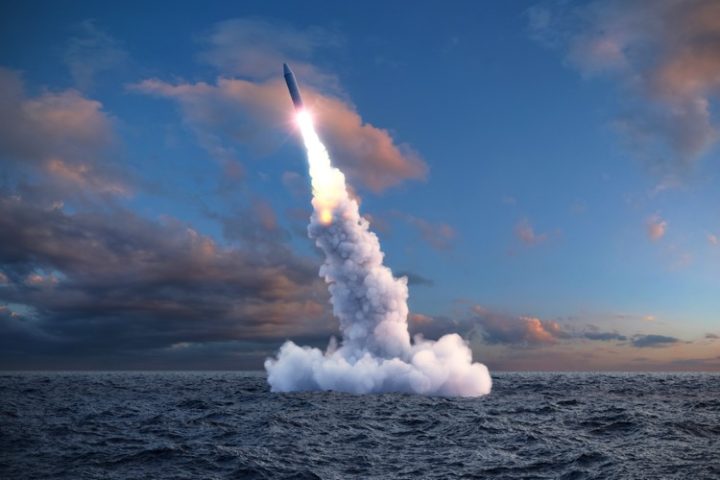
On February 13, Katarina Barley, the leading MEP from German Chancellor Olaf Scholz’s Social Democratic Party (SPD), said that U.S. allies in Europe should not have to keep depending on Washington for a nuclear deterrent.
The MEP was asked to remark on recent comments by U.S. presidential hopeful Donald Trump that Washington should not defend NATO allies who do not meet their payment targets.
“In view of Donald Trump’s recent statements, we can no longer rely on” the United States providing European NATO members with its nuclear umbrella, Barley told the German daily Tagesspiegel. A “European bomb” could become a step on the way to a “European army,” she elaborated.
If the United States stops providing arms to Ukraine, the EU will “have to take on this responsibility” as “we must take [Russian President Vladimir] Putin’s threats seriously and behave accordingly.” She also accused Putin of “publicly questioning the territorial integrity of Poland and Lithuania.”
In turn, Martin Schirdewan, the leading EP candidate of Die Linke (The Left), slammed Barley’s remarks. He told AFP that the appropriate answer to “nonsense” coming from Trump was not nuclear proliferation but de-escalation.
“It would be more sensible to have an EU that is committed to a policy of reconciliation, disarmament and social justice across borders,” Schirdewan said, accusing the SPD of “saber-rattling.”
“More atomic bombs will not make the world safer,” Schirdewan added, pointing out the current global arsenal can destroy the planet 50 times over. Instead of contemplating nuclear weapons, the SPD should push Germany to “finally sign the Treaty on the Prohibition of Nuclear Weapons,” said the leader of Die Linke.
Both the United States and the EU have sent tens of billions of dollars’ worth of weapons, ammunition, and equipment to Ukraine over the past two years, but have grappled to meet Kyiv’s demands. Trump’s comments were made at an election rally, regarding the failure of a dozen NATO members to spend the agreed-upon two percent of GDP on defense.
One U.S. commentator has urged for giving nuclear weapons to Poland in order to “Trump-proof” Washington’s policy in Europe. Warsaw has yet to officially comment on the idea.
Former Russian President Dmitry Medvedev has cautioned the West that any direct clash with Russia would quickly go nuclear, urging U.S. and EU leaders to be honest with their people about this instead of “treating them like brainless idiots.”
Meanwhile, the Chinese Foreign Ministry said Beijing rejects “illegal sanctions” by the EU and will defend the interests of its companies, following a report by the Financial Times [FT] on February 12 that the EU could blacklist some of the country’s firms for allegedly helping Russia to circumvent the bloc’s embargoes.
The EU is planning to impose restrictions on three Chinese businesses and one Indian company as part of its 13th round of sanctions on Russia over its conflict with Ukraine, based on the FT report.
Brussels claims the respective firms are helping Moscow to avoid existing restrictions, particularly via the supply of electronic components that can be repurposed for use in drones and other weapons systems. If EU member states approve the plan, it will see the EU sanction firms from mainland China and India — two of the bloc’s key trading partners — for the first time.
“We are aware of the relevant reports,” the Chinese Foreign Ministry said in a statement on February 13. “China firmly opposes illegal sanctions or ‘long-arm jurisdiction’ against China on the grounds of cooperation between China and Russia.”
Chinese and Russian companies “carry out normal exchanges and cooperation and do not target third parties, nor should they be interfered with or influenced by third parties,” the ministry added.
Beijing “will take necessary measures to resolutely safeguard the legitimate rights and interests of Chinese enterprises.”
As per media reports, the EU was already considering sanctioning Chinese firms over their links with Russia last year, but stopped short of doing so after Beijing assured Brussels that it was not backing Moscow’s military effort in Ukraine.
Besides, Indian newspaper the Economic Times claimed on February 14 that the government in New Delhi was also studying reports that an Indian firm could face sanctions over its interactions with Russia.
The Indian authorities may ask senior EU officials to clarify the situation during their meetings as part of the Raisina Dialogue forum on geopolitics and economy, which will take place in New Delhi next week, the outlet stated.
Moreover, the paper’s source said it was “curious” that the report had emerged before the high-profile event in the Indian capital.
Since the outbreak of the conflict between Russia and Ukraine in February 2022, both China and India have consistently urged for a peaceful resolution of the crisis. Beijing and New Delhi have withstood Western pressure to join sanctions on Moscow. Rather, they have bolstered economic cooperation with Russia, becoming the main destinations for Russian oil.
Chinese customs data reveal that trade turnover between the two countries has risen by 26.6 percent in the past year, reaching a record $240 billion. Also, sales between Russia and India in the first 10 months of 2023 stood at almost $55 billion, as claimed by the Russian ambassador in New Delhi — a rise of 41 percent compared to 2022.
Additionally, Russian Foreign Ministry spokeswoman Maria Zakharova warned on February 13 that Russia would consider Western nations “thieves” and would respond with “very harsh” countermeasures should its frozen assets be confiscated.
Her remarks came after the European Council adopted steps for the potential seizure of interest earned on Moscow’s frozen sovereign funds.
Western countries have banned an estimated $300 billion in assets belonging to the Russian central bank since the start of Moscow’s military campaign against Ukraine in February 2022. Of that amount, €196.6 billion ($211 billion) is being held by the Belgium-based clearing house Euroclear, which last year earned nearly €4.4 billion worth of interest on the funds.
Although there have been calls to confiscate the money outright and transfer it to Ukraine, skeptics have cautioned that this could undermine global trust in the EU’s banking sector, with such dramatic measures being legally questionable.



